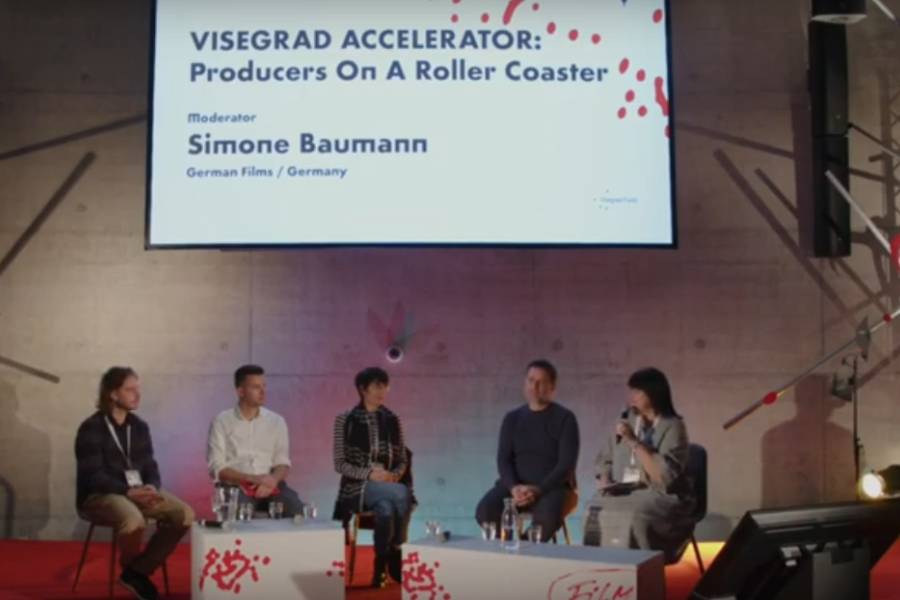Click HERE to watch the recording of the Ji.hlava panel.
It was no surprise that the talk about the results of the pandemic took over. The main topic of the past year and a half was the survival of the industry faced with the disruption of standard production and distribution. “In the first couple of months the state decided to support all companies with employees, but after that there was not much support for the film industry, to be honest,” explained László Józsa of The Speakeasy Project and MADOKE Hungarian Documentary Association. “I should give credit to our film fund which at least focused on ongoing productions. The fund has undergone some crucial positive transformations during the last years, but the new funding system arrived together with covid, so we could not fully benefit from it yet. (…) Hungary is also reliant on international productions filming in the country, so luckily some exceptions were arranged for them to be able to come – as a result the big money didn’t go away and the industry stays alive.”
Zuzana Mistríková of PubRes and the Slovak Association of Independent Producers talked about similar pandemic hardships. “There was an attempt to help individual workers, but not to companies. There was no systemic help anywhere and the audio-visual sector was no exception. Our Fund decided to focus on development and encouraged people to write and prepare projects for the future, but there was no support for producers. There was some small help for cinemas, however. We discussed a lot more, for example help for distributors, but nothing happened, as the state did not give the fund any extra money.”
According to Vratislav Šlajer of Bionaut and the Audiovisual Producers' Association, also in the Czech Republic everything stopped on 20 March 2020, but not for long. “Closed borders and cinemas were a big hit to the industry. Luckily, we have the Film Fund which was very helpful and very operative. The Fund together with APA created safety regulations that we implemented quite quickly, so the shooting could be renewed already during May. The Fund kept opening calls as usual, plus several special ones for special needs of the pandemic time.”
Stanisław Zaborowski of Silver Frame and KIPA Polish Producers Alliance had similar experiences to Šlajer. “Of course the situation was quite bad, but we got some support from the Polish Film Institute and some state support for people who run micro and small companies.”
It seems clear that institutional and state support proved crucial and necessary, as the industry itself showed not to be fully prepared for a crisis like this. For example, Šlajer indicates that “None of the countries succeeded in creating a Covid insurance. In the current situation, it is necessary for the producer to include upfront the possibility that a production will be stopped for some time because of Covid – the time schedule and contracts need to take this possibility into account. That is the only thing that can be done, really.” Mistríková agrees: “This is a highly discussed issue, especially in small countries. In reality, you just cannot insure a film production in Slovakia. Productions that managed to survive usually did so thanks to international cooperation, like in the case of Czech Republic and Slovakia.”
She also describes the attempt to follow the example of the Czech Republic and establish a set of self-regulating rules and measures. “For two main reasons: the possibility to continue shooting and the possibility to cross borders. Thankfully, together with the Ministry of Culture, we managed to assure that film crews are able to travel unless complete lockdown occurs. And that is absolutely crucial for us. Institutions in Slovakia truly tried their best, but for example the Public Television isn’t in such a good place itself financially. We needed the help of the Czech Television.”
Nobody bankrupted, to Mistríková’s knowledge, “but we see little hope in the future – that goes for producers and distribution. There must exist a system to help in situations like these. The industry will survive, but it is on the edge right now.”
Šlajer also saw no bankruptcies, “but that can be explained by the fact that the film industry is a long-term business and companies usually are prepared for periods of time without immediate income – so in a way, the real impact of the pandemic can yet appear, now that the wells are going dry. Thankfully, the industry is starting again and for example a lot of foreign productions have come back to the Czech Republic, even some of the biggest we've ever had.”
Józsa’s company would be bankrupt if it relied on documentaries. “Some of us hardly made it. I know filmmakers that had to take a second job. It was really hard to live through all those harsh stories, especially when we finally seemingly had all we needed to build the industry we wanted, before Covid came.”
It is obvious that the pandemic came in the middle of a transitional process of the film industry and only sped up the process that was already underway. “We are right now working on transforming the Film Fund into an audio-visual Fund that would include the television and game industry," explains Šlajer.
“In Hungary, there had already been discussion about online distribution before Covid,” explaines Józsa. “How to watch Hungarian films online is a big issue. There are two main streaming platforms. One is lead by the Film Fund, which is very professional, even making its archives public, so there is a movement.” Šlajer agrees. “We are awaiting data about the growth of the digital market. Before the pandemic, around 10% came from streaming. That number has definitely grown, we just don’t know how much yet.” According to Józsa, however, there is still not  enough money in VOD. “It mostly just feeds the ego of filmmakers that someone can watch their films at all.” Mistríková has similar experience: “The Czech and Slovak markets are very connected, so many VOD platforms are Czecho-Slovak by default. But the money in it is not sufficient yet, it is definitely not something a film producer can live from.”
enough money in VOD. “It mostly just feeds the ego of filmmakers that someone can watch their films at all.” Mistríková has similar experience: “The Czech and Slovak markets are very connected, so many VOD platforms are Czecho-Slovak by default. But the money in it is not sufficient yet, it is definitely not something a film producer can live from.”
According to Zaborowski, right now the market needs to focus on establishing good platforms for film distribution while securing cinemas to stay with us as long as possible. “We will probably have to accept cinema as an exclusive presentation due to higher prices and lower audience numbers, but that doesn’t mean it can’t survive in this form if other platforms work satisfactorily.“
Cinemas are not yet dead, at least according to Šlajer. “The year 2020 was helpful for some, especially smaller, Czech films in cinemas, because during the period between two lockdowns, there were no American productions. Thanks to that, some films got even better numbers than they could expect in a normal situation. On the other hand, in 2021 cinemas are overcrowded and it is quite an experience. Total numbers are not bad, but individual titles have it very hard – art productions and documentaries underperform heavily in this time. Audiences have come back, but only for big productions – American or local, but big.”
Zaborowski points out that “the crisis showed us that we must search for new ways of distribution. We need to change our mindset about artistic and smaller projects, because now they don’t have any specific support, which needs to change. Netflix had a great catalogue when it came to Poland but has been shifting to more mainstream ever since. There is also a discussion about the quality of the audience. We need to educate people about all the possibilities films have and then we need to give them a platform to find those films. Because that is the core of the business – to find people who want to watch your films and give them those films."




















